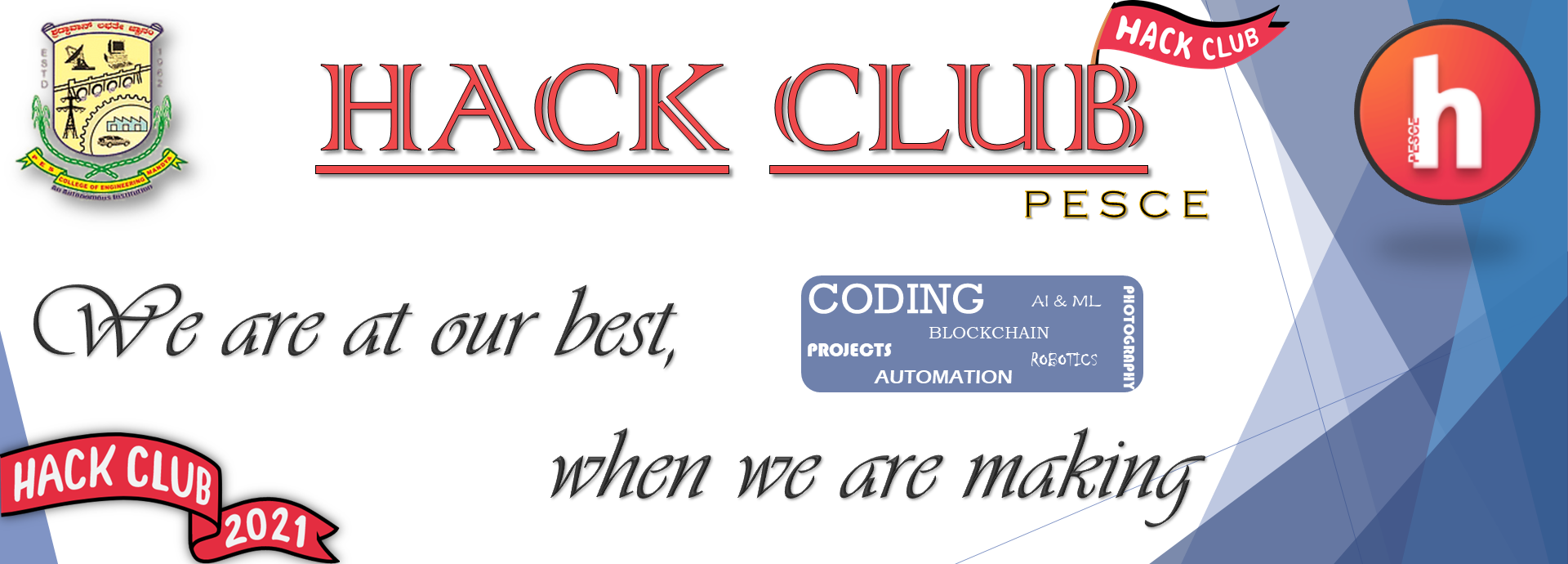Program Overview
The Department of Electronics and Communication Engineering started the B.E. degree program in 1967, the M.Tech. in 2006, and the Ph.D. and M.Sc. (by research) programs in 2004. Initially, the undergraduate program had an intake of 60 students, which has now expanded to 180 students per year. Department ECE is one of the key departments at the institution, focused on providing high-quality technical education in the field of electronics and communication. Here's a brief overview of its focus areas and resources: The department comprises highly qualified and experienced teachers, supporting staff, good laboratory facilities, staff rooms with internet, a seminar room, a library, a computer centre, and other infrastructural facilities. The location and atmosphere are conducive to learning.
Total Intake
180
Program Type
UG
Duration
4 Years
- About Course
- NBA
- Faculty
- Placement
- Research
- Center of Excellence
- Achievements
- Professional Clubs And Chapters
- Results & Role of Honor
- MOOCs
Vision
"The department of E & C would endeavour to create a pool of Engineers who would be extremely competent technically, ethically strong also fulfil their obligation in terms of social responsibility."
Mission
The Department of Electronics and Communication Engineering is committed to
- DM1: Adopt the best pedagogical methods and provide the best facility, infrastructure and an ambience conducive to imbibe technical knowledge and practicing ethics.
- DM2: Group and individual exercises to inculcate habit of analytical and strategic thinking to help the students to develop creative thinking and instil team skills.
- DM3: MoUs and Sponsored projects with industry and R & D organizations for collaborative learning
- DM4: Enabling and encouraging students for continuing education and moulding them for life-long learning process.
Programs Offered
- Undergraduate Program (B.E.):The department offers a Bachelor of Engineering in Electronics and Communication Engineering, focusing on areas such as communication, signal processing, VLSI design, embedded systems, and image processing.
- Postgraduate Program (M.Tech): In 2012, the department introduced a Master of Technology program specializing in VLSI Design and Embedded Systems.
- Research Programs: Recognized as a research center by Visvesvaraya Technological University (VTU) and the University of Mysuru, the department offers part-time and full-time Ph.D. programs.
Curriculum and Research
The curriculum is designed to cover a wide array of topics in electronics and communication, such as VLSI, embedded systems, signal processing, communication systems, and IoT. The department emphasizes research-driven education, aiming to make students industry-ready through practical exposure and projects.
Faculty
The department boasts a team of experienced and dedicated faculty members, many of whom hold Ph.D. degrees and have significant research and industry experience. They are involved in cutting-edge research and often publish in reputed journals.
Laboratories and Facilities
ECE at PESCE Mandya is equipped with well-established labs, including VLSI and Embedded System labs, Signal Processing labs, and Communication labs. These facilities provide hands-on experience and support various student and faculty research initiatives.
VLSI Design Laboratory
Established in 2010-12 with funding from the Vision Group on Science and Technology (VGST), Government of Karnataka, this lab conducts regular training programs for students, research scholars, and faculty.
Medical and Image Processing Laboratory
This facility focuses on medical image modalities and processing, including areas like diabetic retinopathy and MRI image segmentation algorithms.
Industry Collaborations and Projects
The department regularly collaborates with industries and R&D organizations, facilitating internships, workshops, and projects that give students real-world experience and prepare them for future careers in technology.
Workshops and Skill Development
The department regularly organizes workshops and hands-on training sessions in collaboration with industry partners.
Student Clubs and Activities
The ECE department encourages participation in technical clubs and student chapters like IEEE and ISTE. Through these platforms, students engage in technical events, hackathons, seminars, and industry visits, enhancing their learning and networking opportunities. Students from the ECE department have demonstrated excellence in various competitions.
The ECE department at PESCE Mandya stands out for its commitment to quality education, research, and practical experience, preparing students for dynamic roles in the electronics and communication sector.
Program Educational Objectives (PEOs)
Graduates of the program will be able to
- PEO1: Graduates to exhibit knowledge in mathematics, engineering fundamentals applied to Electronics and Communication Engineering for professional achievement in industry, research and academia
- PEO2: Graduates to identify, analyse and apply engineering concepts for design of Electronics and Communication Engineering systems and demonstrate multidisciplinary expertise to handle societal needs and meet contemporary requirements
- PEO3: Graduates to perform with leadership qualities, team spirit, management skills, attitude and ethics need for successful career, sustained learning and entrepreneurship.
Program Outcomes (POs)
Engineering Graduates will be able to
- PO1:Engineering knowledge: Apply knowledge of mathematics, natural science, computing, engineering fundamentals and an engineering specialization.
- PO2:Problem analysis: Identify, formulate, review research literature and analyze complex engineering problems reaching substantiated conclusions with consideration for sustainable development.
- PO3:Design/development of solutions: Design creative solutions for complex engineering problems and design/develop systems/components/processes to meet identified needs with consideration for the public health and safety, whole-life cost, net zero carbon, culture, society and environment as required.
- PO4:Conduct investigations of complex problems:Conduct investigations of complex engineering problems using research-based knowledge including design of experiments, modelling, analysis & interpretation of data to provide valid conclusions.
- PO5:Modern tool usage Create, select and apply appropriate techniques, resources and modern engineering & IT tools, including prediction and modelling recognizing their limitations to solve complex engineering problems.
- PO6:The engineer and society: Analyze and evaluate societal and environmental aspects while solving complex engineering problems for its impact on sustainability with reference to economy, health, safety, legal framework, culture and environment.
- PO7:Ethics: Apply ethical principles and commit to professional ethics, human values, diversity and inclusion; adhere to national & international laws.
- PO8:Individual and Collaborative Team work:Function effectively as an individual, and as a member or leader in diverse/multi-disciplinary teams.
- PO9:Communication: Communicate effectively and inclusively within the engineering community and society at large, such as being able to comprehend and write effective reports and design documentation, make effective presentations considering cultural, language, and learning differences
- PO10:Project Management and Finance: Apply knowledge and understanding of engineering management principles and economic decision-making and apply these to one’s own work, as a member and leader in a team, and to manage projects and in multidisciplinary environments.
- PO11:Life-Long Learning: Recognize the need for, and have the preparation and ability for i) independent and life-long learning ii) adaptability to new and emerging technologies and iii) critical thinking in the broadest context of technological change.
Program Specific Outcomes (PSOs)
Program Specific Outcomes of bachelor degree (B.E, E&C) program are defined as follows which are in line with the Program specific criteria (PSC) as defined by IEEE.
After the graduation, the student will have:
- PSO1: An ability to understand the basic concepts in Electronics & Communication Engineering and to apply them in the design and implementation of Electronics and communication systems.
- PSO2: An ability to solve complex problems in Electronics and Communication Engineering, using latest hardware and software tools, along with analytical skills to arrive at appropriate solutions.
About NBA
| Program Name | Duration | Start | End |
|---|---|---|---|
| Electronics and Communication Engineering | 3 Years | 02-12-2017 | 30-06-2020 |
| Electronics and Communication Engineering | 3 Years | 28-05-2020 | 30-06-2023 |
| Electronics and Communication Engineering | 3 Years | 30-06-2023 | 30-06-2026 |
| Name of Technical Staff | Qualification | Designation | Specialization | Work Experience (Yrs.) |
|---|---|---|---|---|
| Vanitha H K | BE | INSTRUCTOR | MEDICAL ELECTRONICS | 12 Years |
| Madankumar H | BE | TUTOR | ELECTRONICS & COMMUNICATION ENGG | 9 Years |
| M S Kusuma | Diploma | COMPUTER OPERATOR | ELECTRONICS & COMMUNICATION | 16 Years |
| Meghana S P | Diploma | INSRUCTOR | ELECTRONICS & COMMUNICATION | 8 Years |
| Prathibha A | BA | SDA | 10 Years | |
| Rakshith H N | I.T.I | MECHANIC | ELECTRIONCS MECHANIC | 5 Years |
| Abhilash Gowda K V | DIPLOMA | INSTRUCTOR | ELECTRONICS & COMMUNICATION | 2 Years |
| Amulya T.P | B.E | INSTRUCTOR | ELECTRONICS & COMMUNICATION ENGG | 7 Months |
| K Y Chidananda | I.T.I | MECHANIC | ELECTRIONCS MECHANIC | 2 Years |
| G H Hanumanthaiah | S.S.L.C | HELPER | 16 Years | |
| B M Shambulingaiah | PUC | HELPER | 35 Years | |
| H Shivamahadevu | SSLC | HELPER | 22 Years | |
| Harisha V | B.A | HELPER | 13 Years | |
| Nandish M N | SSLC | HELPER | 7 Years |
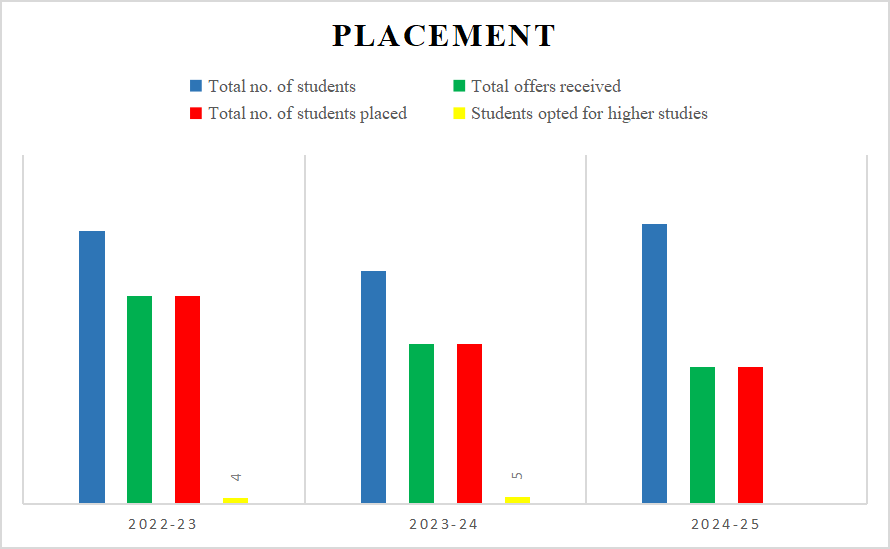
| AY | Total no. of students | Total offers received | Total no. of students placed | Students opted for higher studies |
|---|---|---|---|---|
| 2024-25 | 201 | 98 | 98 | |
| 2023-24 | 167 | 115 | 115 | 5 |
| 2022-23 | 196 | 149 | 149 | 4 |
Ph. D Awarded in the Years 2024-25
| Name | University | Date of Award | Guide Name | Title of Research |
|---|---|---|---|---|
| Vinay Kumar H S | VTU | 01 Feb 2025 | Dr. H S Sheshadri | Study and Development of MR Image Enhancement Algorithms for Early Detection of Brain Disorders |
Ph. D Awarded in the Years 2023- 24
| Name | University | Date of Award | Guide Name | Title of Research |
|---|---|---|---|---|
| Mahesh Kumar A S | JSS | 24 Feb 2024 | Dr. Mallikarjunswamy M S | Study of clinically significant features of Rheumatoid Arthritis (RA) using the radiographic images & IR Thermograms |
| Mukul Manohar S | VTU | 07 March 2024 | Dr. K N Muralidhara | Video Processing and Target Tracking |
| Bharath M R | VTU | 07 March 2024 | Dr. K A Radhakrishna Rao | Multimodal biometric fusion for improved speed security and recognition |
Ph. D Awarded in the Years 2022-23
| Name | University | Date of Award | Guide Name | Title of Research |
|---|---|---|---|---|
| Sahana Raj B S | VTU | 15th Feb 2023 | Dr. V Sridhar | Study of health Monitoring System on IoT Platform using Biometric Crypto System and Its Performance Analysis |
Ph. D Awarded in the Years 2021-22
| Name | University | Date of Award | Guide Name | Title of Research |
|---|---|---|---|---|
| Nanda B S | UOM | 27 July 2022 | Dr. P S Puttaswamy | Investigation on Graphene Field Effect Transistor High Frequency Flexible Transparent Displays |
| Radhika M R | UOM | 22nd March 2022 | Dr. S S Parthasarathy | IMM Filtering for A Highly Maneuvering Target and Performance Evaluation |
| Name | University | Guide Name | Title of Research | Status |
|---|---|---|---|---|
| Noor Ayesha | VTU | Dr. H S Sheshadri | Certain Investigation on Modelling of MRI in Medical Image Computing | Thesis Completed |
| Divyashree N | VTU | Dr. Punith Kumar M B | Novel Efficient VLSI Algorithm and Architecture for Transform Domain Coding and Decoding for Communication Application | Course Work completed |
| Vasanth Kumar Reddy G | VTU | Dr. Punith Kumar M B | Early Prediction and Classification of Diseases in Cotton Plant Leaves Under Complex Field Environment Using Deep Learning | 1st D C Meeting completed |
| M Subramanya | U.O.M | Dr. S.S Parthasarathy | Design and Implementation of Activity-Based Context-Aware System | Pre-thesis Colloquium Scheduled |
| Vidyashree B P | VTU | Dr. Punith Kumar M B | Qualitative Study of Physical Layer Aspects for Sixth Generation Wireless Communication Systems | Registered |
| Asha R | VTU | Dr. Punith Kumar M B | Development of Artificial Intelligence and IoMT-Based System for Biomedical Applications | New Registration |
| Mohan | VTU | Dr. Anand M J | Collision Avoidance System in Transport Industry | New Registration |
| P. Roopa Ranjini | VTU | Dr. Revanesh | Brain Tumour Detection | New Registration |
| Yashwanth B | VTU | Dr. R Manjunatha | AI and IoT Enabled Robotic System for Automated Detection of Ho2 | New Registration |
| Mouna K M | VTU | Dr. R Manjunatha | Investigation of Risk Factors and Strategies to Prevent ROP | New Registration |
| Santha Kumar M T | VTU | Dr. Mahesh Gowda N M | An Application of Artificial Intelligence for Classification and Pollutant Identification in E-Waste | New Registration |
Details of Pursuing Ph.D. in other institutions
| Name | University | Guide Name | Title of Research | Status |
|---|---|---|---|---|
| K C Santhosh Babu | VTU | Dr. A M Vijay Prakash | Performance analysis of low power digital logic circuits based on FinFET technology | Comprehensive viva-voce completed |
| Kusuma H R | REVA University | Dr. Seshikala G | Stutter speech detection | Course work completed |
| Nischitha K | Adichunchanagiri University | Dr. Shobha B N | Detection of Rheumatoid Arthritis (RA) for Knee Image Classification using Machine Learning | Course work completed |
| Niveditha H R | VTU | Dr. Anitha S | Analysis and Prediction for improving the heart disease detection using machine learning classifier | Completed Open Seminar 2 |
| Srinath M S | VIT, Chennai | Dr. R Gunabalan | Enhancement of Charging Efficiency of Batteries for Electric Vehicles | Comprehensive viva-voce completed |
| Name of the Author | Title | Application Number | Status |
|---|---|---|---|
| Dr R Manjunatha, Dr HS Sheshadri, Kumar N Krishna Murthy | Development of an algorithm for early detection of plus disease in retinopathy of prematurity | 202441025734 | Published |
| Mahesh Kumar A S, Dr. Punith Kumar M B, Ashraya A N, Nischith K, Vinay Kumar HS | Statistical Feature Analysis of IR Thermogram Images for Rheumatoid Arthritis Detection Using Machine Learning | 202441025734 | Published |
| Dr. Mahesh, M.Subramanyam | Biomimetic Neuron Model for Efficient Neuromorphic Computing | 202441027226 | Published |
| Dr. Revanesh M, Dr. Sahana Raj B S, Santhosh Babu, Ashraya A N, Vidyashree B P | Improving Network Lifetime: A Novel Energy-Efficient Routing Protocol for Wireless IoT Sensor Networks | 202441028042 | Published |
| M Subramanyam, Dr. S S Parthasarathy | Integrated Framework for Context-Aware Systems: Enhancing Real-Time Response to Critical Events | 202441027156 | Published |
| Dr. MJ Anand, Dr. HR Divakar, Spoorthy MR | A heuristic approach to develop a prototype e-nose to detect spoilage of milk and bread | 202441028040 | Published |
| Dr. N M Mahesh Gowda, Kumar.N. Krishnamurthy, S Jyothi, Dr. Nanda B S, Noor Ayesha | Fire Extinguishing Robot using Microcontroller | 202441027161 | Published |
| Dr. B S Sahana Raj | Block chain Supported Searchable Encryption for Electronic Health Records | 202022106110 | Published |
| Dr. M Revanesh | An Artificially Intelligent Ontological Modelling for Consumer Centric Business Process Customization of Web Services | 202241052074 | Published |
| Dr. BS Sahana Raj Dr. M Revanesh | Video Recommendations using AI | 202241046609 | Published |
| Dr.MJ Anand | An IOT enabled system for Breast cancer Detection using Image Processing | 202241053918 | Published |
| Mr. Mahesh Kumar A S | A System for Development of Non-Invasive Prenatal Testing (Nipt) Model of Human Foetus Using AI & Machine Learning | 202141033346 | Published |
| Mr. Mahesh Kumar A S | Development of Multi-Sensor Smart Robot for Intelligent Border Security Surveillance System | 202141033795 | Published |
| Mr. Mahesh Kumar A S | Machine Learning And IOT Based Smart Wearable System for Autonomous Management of Diabetes Mellitus | 202141030571 | Published |
| Mr. Mahesh Kumar A S | IOT and RFID Based Optimal Positioning of Autonomous Shock Absorber for Smart Vehicles | 202141028518 | Published |
| Mr. Mahesh Kumar A S | Machine Learning Based Smart Grid Power System Integrated with Wireless Communication Networks | 202111027550 | Published |
| Mr. Mahesh Kumar A S | Artificial Intelligence Based Autonomous Pest Detection in Smart Agricultural Farms | 202121026289 | Published |
| Mr. Mahesh Kumar A S | Thermal Camera For Detecting Rheumatoid Arthritis | 382293-001 | Published |
| Mr. Mahesh Kumar A S | NLP & Al Based Automatic Detection Of Infection Rate Of Covid 19 | 202111023806 | Published |
| Mr. Mahesh Kumar A S | Intelligent Battery Intel Swapping Technology for E- Vehicle | 202141023431 | Published |
| Mr. Mahesh Kumar A S | Machine Learning Based EEG Signal Processing for Smart Patient Monitoring System | 202141022214 | Published |
| Mr. Mahesh Kumar A S | Machine Learning Based Breast Cancer Detection by Neuro Fuzzy Logic | 202141018245 | Published |
| Mr. Mahesh Kumar A S | Machine Learning Based Battery Management System for Optimized EV Performance | 202141017715 | Published |
| Mr. Mahesh Kumar A S | Artificial Intelligence Based Cardiac Arrhythmia Detection in Heart Patients | 202121010624 | Published |
| Dr. Revanesh M | Artificial Intelligence IOT Based Wrist Band For Covid-19 Patients | 202141003024 | Published |
| Dr. N M Mahesh Gowda | Renewable Wind Power Through Modified Wind Turbine Rotor for Optimal Power Management in Smart Cities | 2021101376 | Granted |
| Dr. M Revanesh | IFCE-Robot Bird Flying System: Intelligent Robot Bird Flying Controllability Evaluation System | 2021100358 | Granted |
| Dr.MJ Anand | IOT based device to detect the Efficiency of Remote working using DMS Sensor. | 2020104070 | Published |
| Name | Scopus/International Journals | International/National Conferences | Total |
|---|---|---|---|
| Dr. Radhakrishna Rao | 3 | 1 | 4 |
| M. Subramanyam | 4 | 1 | 5 |
| S Jyothi | 2 | 2 | |
| Dr. B. S Nanda | 4 | 2 | 6 |
| Kumar N. Krishnamurthy | 10 | 10 | |
| Dr. M. J. Anand | 15 | 15 | |
| Dr. N. M. Maheshgowda | 12 | 12 | |
| Dr. R. Manjunatha | 8 | 1 | 9 |
| Dr. Mahesh | 2 | 2 | |
| Dr. Punith Kumar M B | 10 | 3 | 13 |
| Dr. Revanesh M. | 14 | 14 | |
| Dr. Sahana Raj B. S | 8 | 2 | 10 |
| Dr. Vinay Kumar H. S | 10 | 2 | 12 |
| Ashraya A. N | 4 | 4 | |
| Nischitha K | 6 | 6 | |
| Santhosh Babu K C | 4 | 4 | |
| Mahesh Kumar A S | 5 | 1 | 6 |
| Noor Ayesha | 2 | 1 | 3 |
| Vidyashree B. P | 4 | 4 | |
| Dr. Radhika M N | 2 | 2 | |
| Sushma P S | 2 | 2 | |
| Spoorthy M R | 3 | 3 | |
| Chaithra K | 4 | 4 | |
| Minugu B | 3 | 3 | |
| Shwetha S K | 2 | 2 | |
| Niveditha H R | 1 | 1 | |
| Yashwanth B | 4 | 4 | |
| Janardhana S Y | 1 | 1 | |
| Yashaswini R | 1 | 1 | |
| Sushma M P | 3 | 3 | |
| Divyashree H S | 2 | 2 | |
| Srinidhigowda | 1 | 1 | |
| Vinayashree B S | 1 | 1 | |
| Navyashree Y V | 1 | 1 | |
| Meghana S | 2 | 2 | |
| Shreelakshmi | 2 | 2 | |
| Niveditha V K | 2 | 2 |
| Investigator | Project Title | Year | Funding Agency | Amount (Rs.) | Status |
|---|---|---|---|---|---|
| Dr. Radhika M. N | Monitoring and Detection of Ammonia and Carbon Dioxide in Poultry Farm | 2023-24 | Karnataka Innovation & Technology Society | 1,35,000 | In Progress |
| Dr. Radhika M. N | Water Tank Automation | 2023-24 | Karnataka Innovation & Technology Society | 85,000 | In Progress |
| Srinath M S | Portable Solar Water Bottle | 2023-24 | Karnataka Innovation and Technology Society | 1,25,000 | In Progress |
| Dr. M J Anand | A Heuristic Approach for Design and Develop a Prototype Electronics Nose to Detect Spoilage of Milk and Bread | 2016-2017 | VGST (SMYSR), Karnataka | 5,00,000/- | Completed (2021-2022) |
| Dr. H S Sheshadri | Establishment of Medical Image Analysis Laboratory | 2014-2015 | VGST | 20,00,000/- | Completed |
| Dr. V Sridhar | Infrastructure Strengthening in Science and Technology in Higher Educational Institutions (K-FIST) – Level – 1 (Karnataka Fund) | 2010-2012 | VGST | 20,00,000/- | Completed |
Academic Year 2024-25
Student Achievement
| Name | Description of the Achievement |
|---|---|
| Vikas S, Yashvanth H T, Gowtham M, Kushal G M | Second prize in IDEATHON-2k24 organized by BGS Institute of Technology, Adichunchanagiri University |
| Jashwanth Gowda S P, Chandan N, Yashwanth V Rai, Nandish D S | ₹10,000 cash prize in National Level Hackathon at GSSSIETW, Mysuru |
| Ananya (4PS23EC403), Preethi K M (4PS22EC122) | Second prize in IDEATHON, organized by BGSIT AICTE IDEA Lab, BGSIT |
| Vishwas S, Akash B, Nikhilesh G, Srinivasa H S, Suman M L | Winners of Inter-Collegiate Mysuru Division Level KHO-KHO Tournament held at MIT, Thandavapura |
| Tejas M S | Bronze medal in Low Kick at IAKO National Kickboxing Championship 2024 held at V.K. Krishnamenon Indoor Stadium, Kozhikode, Kerala |
Academic Year 2023-24
Faculty Achievement
| Name | Description of the Achievement |
|---|---|
| Vinay Kumar H S | Best Poster Presented at Research Conclave-2024 organised by PET Research Foundation in collaboration with Institution’s Innovation Council (IIC), PESCE Mandya |
| Vinay Kumar H S | Certificate was awarded to for the role as SPOC of the SWAYAM-NPTEL. |
Student Achievement
| Name | Description of the Achievement |
|---|---|
| Pradeep Nagavath | 3rd place in Plasma Pull in Annual Technical Fest of IIT Roorkee |
| Harsh Rajkumar | Won first place in Pitch Premer conducted by Techkriti’24, IIT Kanpur |
| Usha B M | 10th Rank in Java Programming Quiz organized by Prasad V. Potluri Siddhartha Institute of Technology (PVPSIT), Vijayawada |
| Arun Kumar K S | Best Idea Award in The Innovative Idea held at Vidyavardhaka College of Engineering, Mysuru |
| Preethamraj R | First prize in Entrophosis, Pragyatha’23 Hackathon at MCE, Hassan |
| Mahentesh, Harshith S | Runner-up in Badminton at Inter-Collegiate Mysuru Division Level Tournament held at NIE South Campus, Mysuru |
| Chethan Kumar K | Runner-up in Kabaddi at VTU Inter-Collegiate Mysuru Division Level Tournament held at Mysore College of Engineering and Management |
| Vishwas Gowda C. H, Chethan Kumar K | Runner-up in Kabaddi at VTU Mysuru Zone Kabaddi Championship |
| Aniruddh P Koundinya | Awarded IEEE Outstanding Young Professionals Volunteer |
Academic Year 2022-23
Student Achievement
| Name | Description of the Achievement |
|---|---|
| Pratiksha Y | Participated in Project Review at Sir M Visvesvaraya Institute of Technology, Bangalore |
| Skanda M K | Awarded IEEE Bangalore Section Chair’s Recognition Award |
| Manikant Amaresh Savadatti | Won 2nd prize in Dare to Dream Innovation Contest 3.0 by DRDO, held at Ahmedabad |
Professional Bodies
ISTE PESCE CHAPTER
Indian Society for Technical Education is a professional organization of engineering educators and educational administrators. It is a society registered under the societies Registration Act XXI of 1860. The principle objective of ISTE is to advance the cause of education in general and all its functions which pertain to engineering and also to serve as common agency for simulating and guiding its members to formulate strategies for development of technical education and research.
ISTE had been engaged in a variety of programmes and actions leading to the upgradation and modernization of present day curriculum, faculty and educational infrastructure so as to make the technical education in India comparable with that in the advanced countries.
PES College of Engineering, Mandya became Institutional Member of ISTE in the year 1986.
ISTE-PESCE Chapter, which is a branch of Indian Society for Technical Education, New Delhi, took birth in the PES College of Engineering campus in the year 1989. Almost all the staff members of the institution are life members of ISTE. The members are benefited through attending short term courses and other activities of the ISTE.
Since the beginning of the chapter, many activities have been conducted in the institution for the benefit of staff members and students. A few Programs was also conducted for the family members like short tour, get together, games to spouses and children etc.,
Related Links
ISTE PESCE facebook link ISTE PESCE Instagram linkIEEE PESCE
What started as an elite group 13 years ago, today has sprawled throughout the campus of PESCE making the students technically more competitive, more professional and enhancing their abilities as an engineer. Since then IEEE-PESCE student branch, a division under region 10 of IEEE has been known for the immensity with which its members were bestowed. The very success story of its students as professionals in their respective fields after graduation speaks of its standards. IEEE-PESCE is a blooming group of more than 100 active members involved in participating and organizing a range of activities aimed at enhancing their academic, professional and career lives, with the thoughtful support and guidance of mentors.
IEEE-PESCE Student Branch at PES College Of Engineering, mandya, Karnataka, empowered to grow technically, professionally and academically to grid oneself to be technically proficient with the ebullient attitude that engenders to build a wonderful career ahead. We consider ourselves to be lucky enough to be a part of this growing family and find overwhelmed to welcome everybody to this home of people striving to be savant.
This Student Branch of IEEE, budding since 2007 to create an ambiance where each can flourish by displaying their skills and be abreast with the latest developments in cutting edge technology through team meets and various other events like seminars, workshops held regularly. The most unique Social Activity wing works for something more than just an act of favour charity directed towards doing something for the society. For the efforts that we put in, we have been recognized by the IEEE Bangalore Section and awarded various awards few amongst which are the Best Branch Counsellor Award, Best Website Award and Best Student Volunteer Award, Outstanding Student Volunteer.
Awards won by IEEE-PESCE Student Branch
| Award | Year | Awarded to |
|---|---|---|
| IEEE Mysore Subsection Outstanding Student Volunteer Award | 2023 | Aniruddh P Koundinya |
| IEEE Mysore Subsection Most Promising Student Branch Award | 2021 | PESCE, Student Branch |
| IEEE Mysore Subsection Outstanding Student Volunteer | 2021 | Yeshwant L M |
| IEEE Mysore Subsection Outstanding Student Volunteer | 2021 | Skanda M K |
Projects under IEEE Funding
| Project Name | Developed By | Funded Body |
|---|---|---|
| Virobot: The artificial nurse project | Manikanth Amaresh and Savadatti | IEEE India Council |
| Virobot Mini Prototype | Team Leader: Manikanth Amaresh and Savadatti Team Members: Sushma H S, Dhanush J, and Preetham kishore |
IEEE Student Humanitarian Project |
| Internet Multi Bot | Team Leader: Manikanth Amaresh and Savadatti Team Members: Anup P H, Sushmitha H S, & Bhoomika H J |
IEEE Student Innovative Project |
Contact Us
| Name | Position | Contact Number | |
|---|---|---|---|
| Dr. Vinay S | Branch Mentor | vinay@pesce.ac.in | +91 9986515835 |
| Dr. Punith Kumar MB | Branch Counsellor | punithpes@gmail.com | +91 98444 82308 |
| Dr. Padma MC | WIE Society Mentor | padmamc@pesce.ac.in | +91 9141113030 |
| Dr. Anitha ML | COMSOC Mentor | anithaml@pesce.ac.in | +91 9945576186 |
| Pavan Kumar K | Student Chairperson | pavankumar8656@gmail.com | +917603858545 |
Related Links
SAE COLLEGIATE CLUB-PESCE
SAEINDIA is India's leading resource for mobility technology. As an individual member driven society of mobility practitioners the ownership of SAEINDIA wrests with its members who are Individuals from the mobility community, which includes Engineers Executives from Industry, Government Officials, Academics and Students
SAEINDIA is an affiliate society of SAE International registered in India as an Indian nonprofit engineering and scientific society dedicated to the advancement of mobility industry in India.
SAE Collegiate Club, a student club has been formed in the year 2007 in association with Dept of Mechanical, Automobile, Industrial Production and Engineering. Our club is affiliated to SAE INDIA organization in its Bangalore section. There are about 56898 student members in 468 engineering college throughout India. Our college club is one among them.
By becoming a member of SAEINDIA college club, students become a part of a global organization whose benefits are geared specifically to the needs of the mobility engineering community. Students' formal education and professional development will be enhanced through your SAEINDIA member benefits.
Presently there are 43 student members in our club. The members have organized various technical events such as PAPER PRESENTATION, EXHIBITION Competitions and Technical talks on diverse topics. Our students have participated in the BAJA Competition which will be held every year.
"VIDHWEGH REnergised", "VIDHWEGH ELECTRIFIED", teams comprising of 15 members each, from our collegiate club is participating in a Hybrid event named "ELECTRIFYING GREEN ASPIRATION (EGA)", conducted by SAEINDIA-Bangalore section, which will be held in Bangalore, in the month of November-2017.
Students of our collegiate club are also looking forward to take part in SUPRA-2018 and other events conducted by SAE.
Contact Us
| Sl. No. | Name | Designation | Contact Number | |
|---|---|---|---|---|
| 1 | Dr. J. Venkatesh,HOD, Dept. of Automobile Engg. | Senior Faculty Advisor | 9448648108 | Jvenkateshpesce@gmail.com |
| 2 | B Dinesh Prabhu,Asso. Professor, Dept. of Automobile Engg. | Faculty Advisor | 9480477812 | Bdineshprabhu@yahoo.co.in |
| 3 | Swaroop D G | Student coordinator | 8861027644 | dgswaroop@gmail.com |
| 4 | Thejas M | Student coordinator | 9611661541 | thejasm006@gmail.com |
About CSI
The seed for the Computer Society India (CSI) was first shown in the year 1965 with a handful of IT enthusiasts who were a computer user group and felt the need to organize their activities. They also wanted to share their knowledge and exchange ideas on a fast emerging sector. Today the CSI takes pride in being the largest and most professionally managed association of and for IT professionals in INDIA. The purpose of the society is scientific and education, directed towards the advancement of the theory and practice of computer science and IT. The organization has grown to an enviable size of 100,000 strong members consisting of professionals with varied backgrounds including software developers, Scientists, Academicians, project managers, CIO's, CTO's and IT vendors to just name a few. It has spread its branches all over the country. Currently having more than 500 student branches and rooted firmly at 73 different locations, CSI has plans of opening many more chapters and activity centers in smaller towns and cities of the country. The idea is to spread the knowledge and provide opportunities to as many interested as possible.
THE CSI VISION: "IT for Masses"
Keeping in mind the interest of the IT professionals and computer users CSI works towards making the profession an area of choice among all sections of the society. The promotion of Information Technology as a profession is the top priority of CSI today. To fulfill this objective, the CSI regularly organizes conferences, conventions, lectures, projects, awards. And at the same time it also ensures that regular training and skill updating are organized for the IT professionals. Education Directorate, a special wing of CSI helps physically challenged citizens by providing training 'Punarjani'. CSI also works towards a global approach, by seeking out alliances with organizations overseas that may be willing to come forward and participate in such activities. CSI also helps governments in formulating IT strategy and planning.
CSI- Student chapter, PESCE
To be a part of the distinguished fraternity of famous IT industry leaders, brilliant scientists and dedicated academicians our college has attained institution membership of CSI from 1st January 2015 and it is our privilege to announce that our department has open CSI-student chapter under the leadership of our HOD Dr. M. C. Padma. With her esteem support, around 108 students have registered to become CSI members. The aim of this body is to create opportunity for students to interact with industry professionals and to organize seminars/workshops/competitions etc. The department has nominated Mrs B S Mamatha as student branch co-coordinator for CSI-student chapter and Mrs B P Chaitra & Mr. Yoga B S as nominee members. CSI core committee members are also nominated for our CSI-student chapter and the list is given below.
CSI-Student chapter core committee members
| Name | Position |
|---|---|
| Ruksar Ahmadi | Student Chair |
| Pratyush Kumar | Vice Chair |
| Rubal Guptha | Secretary |
| Ashwini M J | Joint Secretary |
| Abhisht Aharma | Treasurer |
| Vidyashree H K | SAC Co-ordinator |
| Archana Muralidharan | Communication Lead |
| Yashwini S | Designer |
| Shreeraksha | Asst. Designer |
| Kshitiz Raj | Web Master |
| Vishal Soni | Asst. Web Master |
| Albert Abraham | Director of Technical Activities |
| Vidya | Director of Social Activities |
| Vyjayanthi | Membership Head |
Activities
"IGNITING THE INTELLECTS"
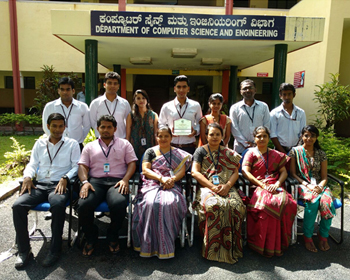
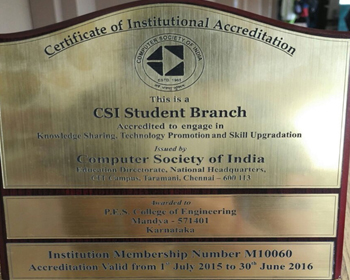
INAUGURATION
Objective:Inauguration of Computer Society of India (CSI) student chapter in P.E.S. College of Engineering, Mandya.
Date: 20th November, 2015
Time: 10.00 AM
P.E.S College of Engineering in association with Department of Computer Science and Engineering inaugurated the Computer Society of India student chapter on 20th November, 2016. The CSI chapter of the college consist of more than 75 students including core team members. The Inauguration started with a melodious invocation song which was followed by a welcome speech by the student chair Rukshar Ahmadi who welcomed our privileged guests and addressed the gathering. Our respected principal, Dr. V. Sridhar was the chief guest to this function. Dr.Rajkumar Vedam Consultant Engineer, Houston, Texas, US inaugurated the CSI student chapter by lighting the lamp, in presence of professor and head of department of CSE, Dr M.C. Padma, Smt. Mamatha B.S SBC, CSI-Student chapter, and all the professor of department of computer science
The event proceeded with the address speech of our beloved HOD who enlightened the students on the future goals of the chapter and shared her vision with the student. The event was more successful after the technical talk on Listening, Communication and, Career Opportunities was delivered by Mrs. Vathsala S Bhat, Dean at RIIT Mysuru. The inauguration went ahead with a short quiz event followed by vote of thanks. The overall feedback was quite positive and we hope to conduct more number of events in the upcoming days.
GNU/LINUX USER'S GROUP P.E.S. COLLEGE OF ENGINEERING, MANDYA


GNU/LINUX Users have formed a group called GLUG in P.E.S. College of Engineering, Mandya. The main objective of this group is to provide awareness of free software in students. Free software means software that respects user's freedom and community. Roughly, it means that the users have the freedom to run, copy, distribute, study, change and improve the software. Thus, "free software" is a matter of liberty, not price. To understand the concept, you should think of "free" as in "free speech", not as in "free beer". GLUG campaign for these freedoms because everyone deserves them. With these freedoms, the users (both individually and collectively) control the program and what it does for them. When users don't control the program, we call it a "non-free" or "proprietary" program. The non-free program controls the users, and the developer controls the program. This makes the program an instrument of unjust power. This group is strongly supported by Free Software Movement of Karnataka (FSMK) group.
GLUG, PESCE is active in conducting technical events like regular workshops, Hands-on sessions, conferences, etc. GLUG is co-ordinated by Dr. Minavathi, Professor, PESCE, Mandya.
Table below gives a brief report of GLUG, PESCE activities from 2015 to 2019:
| DATE | ACTIVITY | RESOURCE PERSON |
|---|---|---|
| 17-08-2015 | Orientation | Mr. Rakesh. P, alumni of PESCE, database administrator in SPAN INFOTECH , Executive member, FSMK Organization , Bangalore |
| 29-08-2015 | OSM Tracking Using Android App | Rakesh. P and Shijil Executive members FSMK Organization , Bangalore |
| 29-08-2015 | Session on PHP | Mr. Manu, VTIGER, Bengaluru and Alumni PESCE, Mandya |
| 12-09-2015 | Xubuntu, LINUX Installation Fest | Rakesh, Manu, Vishal and Shijil from FSMK |
| 03-10-2015 | Introduction to basic commands in Linux | Ramyashree P.M and Vaibhav Vishal volunteers of GLUG, PESCE |
| 17 & 18th Oct, 2015 | "DRUPAL" Workshop | Rameez Thonnakkal, joint secretary,FSMK Organization and Shijil Executive member FSMK Organization , Bangalore |
| 19-10-2016 | Introduction to Linux | Shubodip Ghosh and AmoghaVarsha, GLUG core member, PESCE, Mandya |
| 06-11-2016 | Java Chat application | Nootan, GLUG core member, PESCE, Mandya |
| 03-02-2017 | Linux Installation Fest | Praveen Kumar B. N. and Amoghavarsha, GLUG core members |
| 09-02-2017 | Introduction to OSS and Free Software | Anup Pravin, alumni of PESCE and an FSMK member |
| 16-02-2017 | Basic Commands in Linux | Harshitha. R, Anant Mohan and Sindhu, GLUG core members and FSMK members |
| 01-03-2017 | Shell Scripting | Amoghavarsha, GLUG core member, PESCE, Mandya |
| 16-03-2017 | Shell Scripting | Amoghavarsha, GLUG core member, PESCE, Mandya |
| 20th to 24th January, 2019 | Residential Camp – “FSMK Winter Camp’ 19” | Dr. Richard Stallman, GLUG & FSMK core members |
PLUG-IN
It’s not for you, it’s you
Origin
Plug-In is the club which started to help the ECE department students in all the aspects to achieve the proficiency. It was the idea of Adarsh H R, Ganesh R Bhat, Ullas Gowda G L and Nandish Urs N (2013 batch students). It is the only club that has got intiated after 20 long years of closing the great HAMMING club of our department. It is the only club that our department has still today and operated by students only. It has been around one and half year of its establishment in which it has organized many events and few intra college events too from our supporting team. Today we have around 170 students who are there in our club and we are guided by our faculty advisor Mahesh Koti, Associate Professor of ECE department.
What is Plug-In????
Plug-In is a technical group which operates on behalf of ECE Association. Plug-In conducts both technical and non technical events. Through the activities which we conduct we are trying to enhance the skills of the individuals and making them to understand their potential, their talents in handling the situation and finding the best way to stand as a winner.
Moto of Plug-IN
The moto of PLUG IN is,
- To have a honest approach to explore the domain….!
- To provide the platform for the students to carve the best version…..!
- To create a tour to the mysterious world of technology…..!
- Last but not the least, to motivate the students to develop self confidence, discipline and leadership qualities which will help them to build their professional life……
Activities conducted by Plug-In
| Event Name | Year | Description |
|---|---|---|
| Quiz-In | 2015-16 | This was the first activity conducted by Plug-In. The topics were mainly on basic electronics. |
| Talk-In | 2015-16 | This was a technical talk by Dr K A Radhakrishna Rao on Digital Image Processing. It was an industrial interaction with the students. |
| Quest-In | 2016-17 | It was a treasure hunt event and was the most successful event organized by Plug-In wherein 200 students participated in the event. |
| Fumour | 2016-17 | This was organized mainly to see the creativity and thinking ability of the students. |
| Code-Kshetra | 2016-17 | It was a programming event where all the IT department students were allowed to participate, and it was organized twice. |
| Adzap | 2017-18 | It was organized to check the managerial and thinking skills of the students. |
| MATLAB | 2017-18 | This was a workshop organized for the students of the ECE department. |
Even Plug-In organized social activitiy. We thought about operating Computer to the government students who were not aware of that and our beloved HOD Dr K A Radhakrishna Rao sir also donated a Computer to the school.
Plug-In Core team
| Posts | Name |
|---|---|
| President | Vinutha Singh S |
| Vice President | Anupama K M |
| Secretary | Spandana H N |
| Joint Secretary | Meghana M R |
| Treasurer | Kuthejatul Kubra |
| Editor | Anushree Pai G |
| Director of Networking | Pratheek P |
| Director of Technical activities | Disha J H |
| Director of Communication | Faisal Mahmood |
| Webmaster | Harshitha G |
| Director of Membership | Abhilakhi N |
| Pooja J P | |
| Director of Social activities | Ravi Kiran K B |
Hack Club
Hack Club PESCE, Mandya
A group of students with passion to learn and develop. A technical club "By the students-For the students". We learn by making and we enjoy making different fun and awesome projects. The point is to learn and develop technical skills while making friends and enjoying the journey. We want to create a community where we can all discuss and work on skills like IoT, Web Dev, AI, Machine Learning, Robotics, Photography and more (There are other secret sects like Anime, Piracy, etc). This is a completely open community where you don't have to pay any money to join but you have to show us your interest and passion for making. Come join us and make something cool !!!!
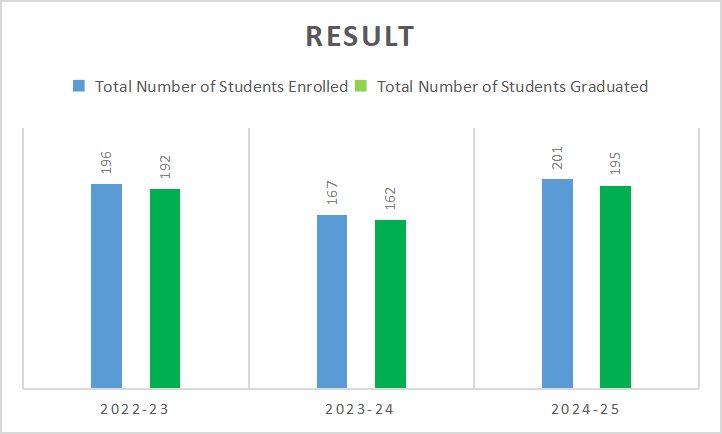
Academic Year 2024-25
| Name of Student | USN | CGPA | Rank |
|---|---|---|---|
| Supreetha G J | 4PS20EC126 | 9.74 | 1 |
| Vimala C J | 4PS20EC148 | 9.51 | 2 |
| Shraddha M P | 4PS20EC113 | 9.40 | 3 |
Academic Year 2022-23
| Name of Student | USN | CGPA | Rank |
|---|---|---|---|
| Gowthami Gowda H P | 4PS19EC048 | 9.79 | 1 |
| Vinay B S | 4PS19EC170 | 9.59 | 2 |
| Usha K | 4PS19EC164 | 9.38 | 3 |





































